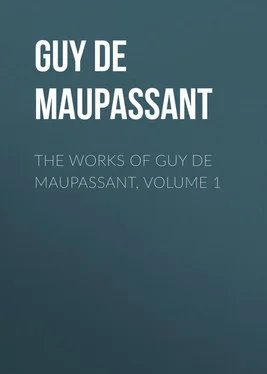Guy Maupassant - The Works of Guy de Maupassant, Volume 1
Здесь есть возможность читать онлайн «Guy Maupassant - The Works of Guy de Maupassant, Volume 1» — ознакомительный отрывок электронной книги совершенно бесплатно, а после прочтения отрывка купить полную версию. В некоторых случаях можно слушать аудио, скачать через торрент в формате fb2 и присутствует краткое содержание. Жанр: literature_19, foreign_antique, foreign_prose, на английском языке. Описание произведения, (предисловие) а так же отзывы посетителей доступны на портале библиотеки ЛибКат.
- Название:The Works of Guy de Maupassant, Volume 1
- Автор:
- Жанр:
- Год:неизвестен
- ISBN:нет данных
- Рейтинг книги:4 / 5. Голосов: 1
-
Избранное:Добавить в избранное
- Отзывы:
-
Ваша оценка:
- 80
- 1
- 2
- 3
- 4
- 5
The Works of Guy de Maupassant, Volume 1: краткое содержание, описание и аннотация
Предлагаем к чтению аннотацию, описание, краткое содержание или предисловие (зависит от того, что написал сам автор книги «The Works of Guy de Maupassant, Volume 1»). Если вы не нашли необходимую информацию о книге — напишите в комментариях, мы постараемся отыскать её.
The Works of Guy de Maupassant, Volume 1 — читать онлайн ознакомительный отрывок
Ниже представлен текст книги, разбитый по страницам. Система сохранения места последней прочитанной страницы, позволяет с удобством читать онлайн бесплатно книгу «The Works of Guy de Maupassant, Volume 1», без необходимости каждый раз заново искать на чём Вы остановились. Поставьте закладку, и сможете в любой момент перейти на страницу, на которой закончили чтение.
Интервал:
Закладка:
But Boule de Suif fired up at this for she was a Bonapartist. She turned upon him with scarlet cheeks and stammering with indignation, "Ah! I should just like to have seen any of you in his place! A nice mess you would have made of it! It is men of your sort that ruined him, poor man. There would be nothing for it but to leave France for good if we were governed by cowards like you!"
Cornudet, nothing daunted, preserved a disdainful and superior smile, but there was a feeling in the air that high words would soon follow, whereupon the Count interposed, and managed, not without difficulty, to quiet the infuriated young woman by asserting authoritatively that every sincere opinion was to be respected. Nevertheless the Countess and the manufacturer's wife, who nourished in their hearts the unreasoning hatred of all well-bred people for the Republic and at the same time that instinctive weakness of all women for uniformed and despotic governments, felt drawn, in spite of themselves, to this woman of the street who had so much sense of the fitness of things and whose opinions so closely resembled their own.
The basket was empty – this had not been difficult among ten of them – they only regretted it was not larger. The conversation was kept up for some little time longer, although somewhat more coldly after they had finished eating.
The night fell, the darkness grew gradually more profound, and the cold, to which digestion rendered them more sensitive, made even Boule de Suif shiver in spite of her fat. Madame de Breville thereupon offered her her charcoal foot-warmer, which had been replenished several times since the morning; she accepted with alacrity, for her feet were like ice. Mesdames Carré-Lamadon and Loiseau lent theirs to the two Sisters.
The driver had lit his lanterns, which shed a vivid light over the cloud of vapor that hung over the steaming back of the horses and over the snow at each side of the road, which seemed to open out under the shifting reflection of the lights.
Inside the conveyance nothing could be distinguished any longer, but there was a sudden movement between Boule de Suif and Cornudet, and Loiseau, peering through the gloom, fancied he saw the man with the beard start back quickly as if he had received a well-directed but noiseless blow.
Tiny points of fire appeared upon the road in front. It was Totes. The travelers had been driving for eleven hours, which, with the four half-hours for food and rest to the horses, made thirteen. They entered the town and stopped in front of the Hotel de la Commerce.
The door opened. A familiar sound caused every passenger to tremble – it was the clink of a scabbard on the stones. At the same moment a German voice called out something.
Although the diligence had stopped, nobody attempted to get out, as though they expected to be massacred on setting foot to the ground. The driver then appeared holding up one of the lanterns, which suddenly illumined the vehicle to its farthest corner and revealed the two rows of bewildered faces with their open mouths and startled eyes wide with alarm.
Beside the driver in the full glare of the light stood a German officer, a tall young man excessively slender and blonde, compressed into his uniform like a girl in her stays, and wearing, well over one ear, a flat black wax-cloth cap like the "Boots" of an English hotel. His preposterously long moustache, which was drawn out stiff and straight, and tapered away indefinitely to each side till it finished off in a single thread so thin that it was impossible to say where it ended, seemed to weigh upon the corners of his mouth and form a deep furrow in either cheek.
In Alsatian-French and stern accents he invited the passengers to descend: "Vill you get out, chentlemen and laties?"
The two Sisters were the first to obey with the docility of holy women accustomed to unfaltering submission. The Count and Countess appeared next, followed by the manufacturer and his wife, and after them Loiseau pushing his better half in front of him. As he set foot to the ground he remarked to the officer, more from motives of prudence than politeness, "Good evening, Monsieur," to which the other with the insolence of the man in possession, vouchsafed no reply but a stare.
Boule de Suif and Cornudet, though the nearest the door, were the last to emerge – grave and haughty in face of the enemy. The buxom young woman struggled hard to command herself and be calm; the democrat tugged at his long rusty beard with a tragic and slightly trembling hand. They sought to preserve their dignity, realizing that in such encounters each one, to a certain extent, represents his country; and the two being similarly disgusted at the servile readiness of their companions, she endeavored to show herself prouder than her fellow travelers who were honest women, while he, feeling that he must set an example, continued in his attitude his mission of resistance begun by digging pitfalls in the high roads.
They all entered the huge kitchen of the inn, and the German, having been presented with the passport signed by the general in command – where each traveler's name was accompanied by a personal description and a statement as to his or her profession – he proceeded to scrutinize the party for a long time, comparing the persons with the written notices.
Finally, he exclaimed unceremoniously, "C'est pien – that's all right," and disappeared.
They breathed again more freely. Hunger having reasserted itself, supper was ordered. It would take half an hour to prepare, so while two servants were apparently busied about it the travelers dispersed to look at their rooms. These were all together down each side of a long passage ending in a door with ground glass panels.
At last, just as they were sitting down to table, the innkeeper himself appeared. He was a former horse-dealer, a stout asthmatic man with perpetual wheezings and blowings and rattlings of phlegm in his throat. His father had transmitted to him the name of Follenvie.
"Mademoiselle Elizabeth Rousset?" he said.
Boule de Suif started and turned round. "That is my name."
"Mademoiselle, the Prussian officer wants to speak to you at once."
"To me?"
"Yes, if you really are Mademoiselle Elizabeth Rousset."
She hesitated, thought for a moment, and then declared roundly: "That may be, but I'm not going."
There was a movement round about her – everybody was much exercised as to the reason of this summons. The Count came over to her.
"You may do wrong to refuse, madame, for it may entail considerable annoyance not only to yourself but on the rest of your companions. It is a fatal mistake ever to offer resistance to people who are stronger than ourselves. The step can have no possible danger for you – it is probably about some little formality that has been omitted."
One and all concurred with him, implored and urged and scolded, till they ended by convincing her; for they were all apprehensive of the results of her contumacy.
"Well, I do it for you sure enough!" she said at last. The Countess pressed her hand. "And we are most grateful to you."
She left the room, and the others agreed to wait for her before beginning the meal. Each one lamented at not having been asked for instead of this hot-headed, violent young woman, and mentally prepared any number of platitudes for the event of being called in their turn.
At the end of ten minutes she returned, crimson with rage, choking, snorting, – "Oh, the blackguard; the low blackguard!" she stammered.
They all crowded round her to know what had happened, but she would not say, and the Count becoming insistent, she answered with much dignity, "No, it does not concern anybody! I can't speak of it."
They then seated themselves round a great soup tureen from which steamed a smell of cabbage. In spite of this little contretemps the supper was a gay one. The cider, of which the Loiseaus and the two nuns partook from motives of economy, was good. The rest ordered wine and Cornudet called for beer. He had a particular way with him of uncorking the bottle, of making the liquid froth, of gazing at it while he tilted the glass, which he then held up between his eye and the light to criticise the color; while he drank, his great beard, which had the tints of his favorite beverage, seemed to quiver fondly, his eyes squinting that he might not lose sight of his tankard for a moment, and altogether he had the appearance of fulfilling the sole function for which he had been born. You would have said that he established in his own mind some connection or affinity between the two great passions that monopolized his life – Ale and Revolution – and most assuredly he never dipped into the one without thinking of the other.
Читать дальшеИнтервал:
Закладка:
Похожие книги на «The Works of Guy de Maupassant, Volume 1»
Представляем Вашему вниманию похожие книги на «The Works of Guy de Maupassant, Volume 1» списком для выбора. Мы отобрали схожую по названию и смыслу литературу в надежде предоставить читателям больше вариантов отыскать новые, интересные, ещё непрочитанные произведения.
Обсуждение, отзывы о книге «The Works of Guy de Maupassant, Volume 1» и просто собственные мнения читателей. Оставьте ваши комментарии, напишите, что Вы думаете о произведении, его смысле или главных героях. Укажите что конкретно понравилось, а что нет, и почему Вы так считаете.












